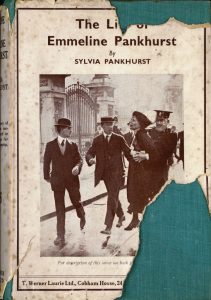Despite the extended character limit now available, Twitter remains a place where nuance remains scarce, with the immediate and readily digestible at a premium. A couple of weeks ago we tweeted this from the GCU Library and Archives account. No doubt it is a striking image; arguably it distills the modern perception of the suffrage movement to its absolute fundamentals – a woman is being literally held by the personification of the law, while contemporary men look on in anger and bemusement. Purely on these terms, the photo is successful.
There is more to it, as an addendum on the book’s back cover notes. It is, I think, worth quoting in full:
‘The illustration on the front of this jacket represents Emmeline Pankhurst, weakened by the hunger and thirst strike, arrested at the gates of Buckingham Palace when the Suffragettes attempted to interview the King on May 21st 1914. The huge policeman gave her a bear’s hug which caused excruciating pain. In her prison cell she suffered for many days.’
These words, written by her daughter Sylvia, give pause. With the benefit of hindsight, it is perhaps easy to fall prey to seeing the success of causes such as women’s suffrage as inevitable – well, of course women were going to get the vote eventually. But think on those words and picture they describe. Someone starving and dehydrated, fifty six years old and aching. The policeman, not gentle, perhaps wanting to make an example. And the men doing nothing but looking on.
We look at Emmeline Pankhurst from a century’s distance and see only vindication, but in this captured moment triumph must have felt further than ever.
It is a lesson in the power of persistence, in knowing what you believe and staying true to those ideals with all odds appearing against you, when no one would blame you for stopping. Writing today as a straight, white man in an affluent nation, I cannot pretend to know such struggle. But I do feel that in the curious times in which we find ourselves it is incumbent to at least try to understand.
The Bob Turner Collection at GCU Archives contain a number of fascinating books on political movements and their various peaks and troughs, with a particular focus on the twentieth century. Anyone with an interest in history and politics can find out more here.
David Ward
Archive Assistant
